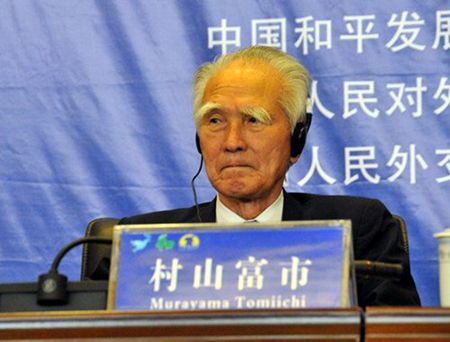How can Japan avoid repeating its mistakes
- By Tomiichi Murayama
 0 Comment(s)
0 Comment(s) Print
Print E-mail China.org.cn, September 4, 2013
E-mail China.org.cn, September 4, 2013
|
|
|
Former Japanese Prime Minister Tomiichi Murayama [File photo] |
Editor: Former Japanese Prime Minister Tomiichi Murayama, in office from 1994 to 1996, has published an article in China's People's Daily, entitled, "How can Japan avoid repeating its mistakes?" The full article follows below as translated by China.org.cn:
Ever since I was young, I have always thought Japan, as a member of Asia, had close ties with every Asian country, no matter whether this relationship hailed from a geo-political or historical perspective. Japan still must continue to establish a trustworthy and substantial base with every Asian country. This remains my life-long belief.
When I was elected Prime Minister, I first visited South Korea, China and other Asian countries, and felt the inerasable hurt and pain caused by Japan during World War II for its invasions of the countries and the ensuing colonial rules. During my term as Prime Minister, I faced the historic moment of the 50th anniversary of the ending of WWII in 1995; a moment when Japan needed to deeply reflect on its war crimes and had to show the world that it was determined to take the path of peace, democracy and international cooperation. Under these circumstances, I gave a speech entitled "Murayama Danwa," translated as "On the occasion of the 50th anniversary of the war's ending."
The reason for "Murayama Danwa" was that I believed that if Japan wished to peacefully co-exist with other Asian countries, and any other country in the world, it would have to bring to the table a thorough reckoning of the past. I think, just through "Murayama Danwa," China, South Korea and other Asian countries, knew Japan had drawn a line under its past, and they subsequently started to understand and accept Japan. Therefore, the Japanese cabinets from that moment onwards – including the first Shinzō Abe administration – all clearly stated they would carry on the legacy of "Murayama Danwa."
However, as Abe took up office as Prime Minister in his second term, he claimed that he "would not take on 'Murayama Danwa' completely," and he also said "the definition of an invasion is not decided upon yet within the international community." Abe clearly stated he would revise "Murayama Danwa."
Although I have no idea how Abe will alter "Murayama Danwa," his denial of any previous invasions will lead to that the relevant countries would distrust any statements made by any previous Japanese Prime Minister. After WWII ended, Japan's history education has featured too many blanks in its recent history; as a result, many Japanese people don't even know about past wars. Learning about the country’s history benefits the establishment of friendly relationships with neighboring countries. It will be significant in Japan's future development as well. I'm very worried about Japan's politics turning right-wing. Japanese politicians need to learn more about Japan's recent history, especially the very history during which Japan invaded and colonially ruled other neighboring Asian countries. Only in doing so, Japan can avoid repeating its past mistakes.
Only because Japan accepted the Potsdam Declaration and the Cairo Declaration as well as the verdicts of Tokyo Trials, did it earn the right to re-enter the international community. If the Japanese Prime Minister and his colleagues in cabinet still pay tribute to the Yasukuni Shrine which houses the enshrinement of the International Military Tribunal for the Far East (IMTFE) war criminals, this means Japan denies the international treaties it has previously accepted. I think the Prime Minister and his colleagues should not pay tribute to the shrine. Although the Constitution modification has recently become a significant subject, I will never agree to let anyone to modify the current Constitution that actually respects basic human rights, peace and democracy.
At the Hiroshima National Peace Memorial Hall for the Atomic Bomb Victims, one monument inscription reads, "Never let mistakes be repeated." I think this is not just the vow of the Hiroshima people, but should in fact be the vow of all Japanese. Creating a peaceful country is the direction pointed out by the Japanese Constitution.
This article was first published in Chinese and translated by Zhang Rui.







Go to Forum >>0 Comment(s)